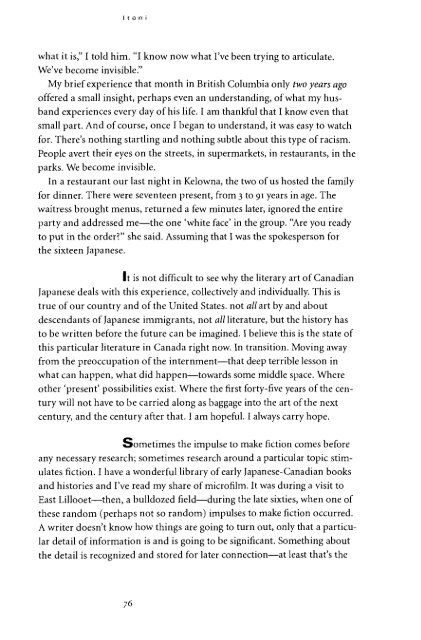To All Appearances A Lady - University of British Columbia
To All Appearances A Lady - University of British Columbia
To All Appearances A Lady - University of British Columbia
Create successful ePaper yourself
Turn your PDF publications into a flip-book with our unique Google optimized e-Paper software.
what it is," I told him. "I know now what I've been trying to articulate.<br />
We've become invisible."<br />
My brief experience that month in <strong>British</strong> <strong>Columbia</strong> only two years ago<br />
<strong>of</strong>fered a small insight, perhaps even an understanding, <strong>of</strong> what my husband<br />
experiences every day <strong>of</strong> his life. I am thankful that I know even that<br />
small part. And <strong>of</strong> course, once I began to understand, it was easy to watch<br />
for. There's nothing startling and nothing subtle about this type <strong>of</strong> racism.<br />
People avert their eyes on the streets, in supermarkets, in restaurants, in the<br />
parks. We become invisible.<br />
In a restaurant our last night in Kelowna, the two <strong>of</strong> us hosted the family<br />
for dinner. There were seventeen present, from 3 to 91 years in age. The<br />
waitress brought menus, returned a few minutes later, ignored the entire<br />
party and addressed me—the one 'white face' in the group. "Are you ready<br />
to put in the order?" she said. Assuming that I was the spokesperson for<br />
the sixteen Japanese.<br />
It is not difficult to see why the literary art <strong>of</strong> Canadian<br />
Japanese deals with this experience, collectively and individually. This is<br />
true <strong>of</strong> our country and <strong>of</strong> the United States, not all art by and about<br />
descendants <strong>of</strong> Japanese immigrants, not «//literature, but the history has<br />
to be written before the future can be imagined. I believe this is the state <strong>of</strong><br />
this particular literature in Canada right now. In transition. Moving away<br />
from the preoccupation <strong>of</strong> the internment—that deep terrible lesson in<br />
what can happen, what did happen—towards some middle space. Where<br />
other 'present' possibilities exist. Where the first forty-five years <strong>of</strong> the century<br />
will not have to be carried along as baggage into the art <strong>of</strong> the next<br />
century, and the century after that. I am hopeful. I always carry hope.<br />
Sometimes the impulse to make fiction comes before<br />
any necessary research; sometimes research around a particular topic stimulates<br />
fiction. I have a wonderful library <strong>of</strong> early Japanese-Canadian books<br />
and histories and I've read my share <strong>of</strong> micr<strong>of</strong>ilm. It was during a visit to<br />
East Lillooet—then, a bulldozed field—during the late sixties, when one <strong>of</strong><br />
these random (perhaps not so random) impulses to make fiction occurred.<br />
A writer doesn't know how things are going to turn out, only that a particular<br />
detail <strong>of</strong> information is and is going to be significant. Something about<br />
the detail is recognized and stored for later connection—at least that's the

















